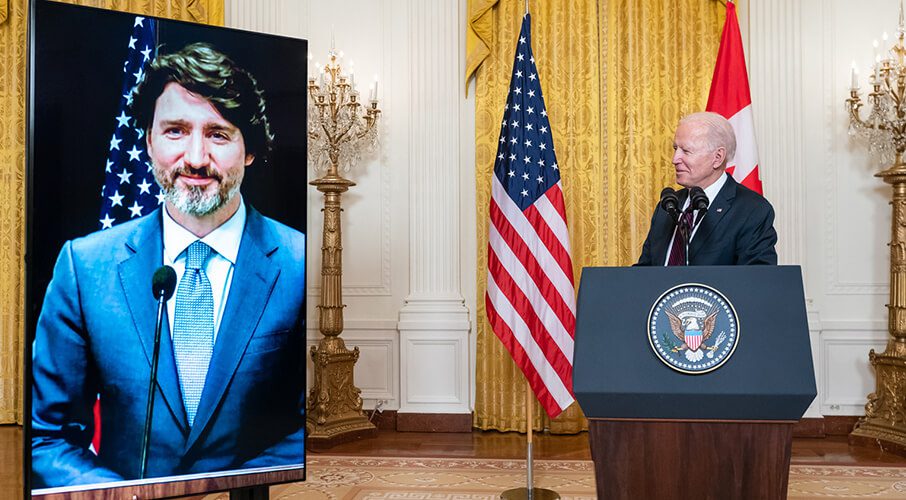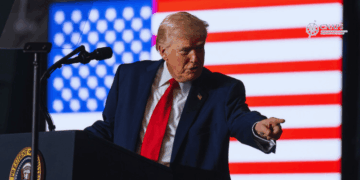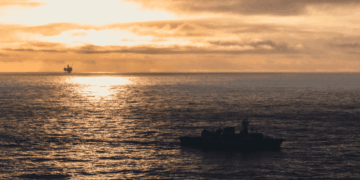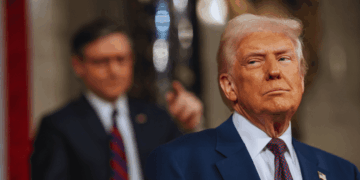This article originally appeared in Real Clear Politics.
By Brian Lee Crowley, March 23, 2023
After the Chinese Communist Party’s 1949 victory in China’s civil war, the question of “Who lost China” rocked Washington. As President Biden makes his first presidential trip to Ottawa this week, he should ask if the next country about which that question will be asked is Canada.
The loss would not be economic. The U.S.-Mexico-Canada (USMCA) trade pact continues to underpin a vast economic relationship neither party wants to undermine, although recent Biden administration policies to promote “Buy America” are an irritant that violates the spirit of that agreement. Canada, as the smaller and more trade-dependent partner, cannot afford to lose the privileged access to U.S. markets that the USMCA ensures.
National security is another matter entirely, however. The last decade has seen a dawning realization in Washington of the dangers posed by a resurgent China heading a group of authoritarian revisionists that includes Russia and Iran. These countries chafe under a rules-based international order that thwarts their will and imposes moral, diplomatic, economic, and military penalties on violators, such as Russia following its invasion of Ukraine. They long for a return to unrestrained Hobbesian Great Power competition.
The United States has risen impressively, if slowly, to this challenge. It has provided extraordinary levels of support to Ukraine. It has spearheaded and embraced innovative arrangements, such as the “Quad” (India, Japan, Australia, and the United States) and AUKUS (Australia, United Kingdom, and the United States) in the Indo-Pacific, and bilateral defense cooperation agreements and NATO expansion to deter Russian aggression in Europe. Moreover, it has become the world’s largest oil producer and LNG exporter, providing a lifeline to a Europe compelled to reduce its reliance on Russian gas.
Canada, in marked contrast, is fast becoming an honorary Third World country from a national security point of view. This is due, at least in part, to Washington’s benign neglect of Canada, thereby encouraging the belief that Canada could embrace China and indulge in diaspora politics with impunity.
Our contribution to joint continental defense, via NORAD, is dilapidated, while Russian and Chinese advances in hypersonic weapons systems have made North America vulnerable. After Russia’s invasion of Ukraine, Canada announced it would spend CAD$4.9 billion over six years to improve our capabilities, but progress is glacial. The will to buy desperately needed new weapons systems is lacking, hence the more than a decade it took us to decide to purchase F-35 fighters. When the leaders of Japan and Germany came and begged Canada to make more of its abundant energy resources available, they were sent away empty-handed.
Canada’s military spending is two-thirds of NATO’s target of 2% of GDP, and a fraction of the United States’ 3.48% . Canada top soldier Gen. Wayne Eyre lamented this month he doubts our capacity to lead a mooted mission to Haiti, our military being already stretched thin by its modest contribution to Ukraine and leadership of the NATO mission in Latvia.
Compare this to the renewed commitment of Australia and the UK under AUKUS to buy new nuclear submarines, to embrace unprecedented levels of technological and command cooperation, and to increase greatly their military spending in consequence. Canada’s response to these shifts has been tepid, slow, and condescending.
Once upon a time Canada’s absence might have been explained by the political sensitivities of being seen as too close to the U.S. and the need to manage the independence movement in Quebec. Those traditional explanations are now taking a back seat to revelations of the extent of China’s penetration of Canada’s institutions at every level, including its political parties.
Canada’s security services have been sounding the alarm on China’s growing interference and nefarious activities for decades; indifference and hostility were official Ottawa’s response. Recently leaked intelligence assessments that Chinese Communist Party United Front operatives worked actively to influence the results of elections at every level have finally caused the public to take notice of the CCP’s clandestine activities.
The reaction of Prime Minister Justin Trudeau has been to appoint a family friend with his own China links as a “rapporteur” to investigate Chinese election interference, and to vilify both the security services and those concerned about China’s violation of Canada’s sovereignty.
Canada’s democracy isn’t the only institution under siege. There has been no public accounting of events at Canada’s infectious diseases lab where Chinese scientists appear to have been sharing research secrets with Chinese authorities. Chinese researchers and graduate students, shut out of the U.S. for security reasons, are heading to Canadian universities, which have close and open research ties with their American counterparts. Canadians of Chinese origin have for years been vainly flagging the presence of representatives of the CCP’s security agencies, who threaten citizens and permanent residents if they do not do Beijing’s bidding.
Canada is now so compromised that Canada’s intelligence-sharing allies, particularly in the “Five Eyes” alliance, quietly wonder if it is safe to share sensitive information with Canada.
Job One for America is rallying the liberal democracies against the depredations of China-led authoritarians. Yet Washington faces the real possibility that its northern neighbor won’t just fail to shoulder its share of the load, but that its institutions may be so compromised as to be unable to act in the interests of the West. It is time for America to start doing its part to arrest Canada’s slow-motion defection by reversing the neglect, complacency, and dismissiveness that helped to create it. As Prime Minister Trudeau likes to say, better is always possible.
The only question that should be on President Biden’s mind, the one on which his entire visit must focus, is this: Is Canada willing and able to cleanse its institutions of the taint of corruption, and to rejoin its traditional partners in a calm but firm commitment to the security, intelligence, and military alliance that is the liberal democracies’ last best hope? A president who doesn’t get that commitment runs the risk of being known as the guy who lost Canada.
Brian Lee Crowley is the managing director of the Macdonald-Laurier Institute, an independent non-partisan public policy think tank in Ottawa.








